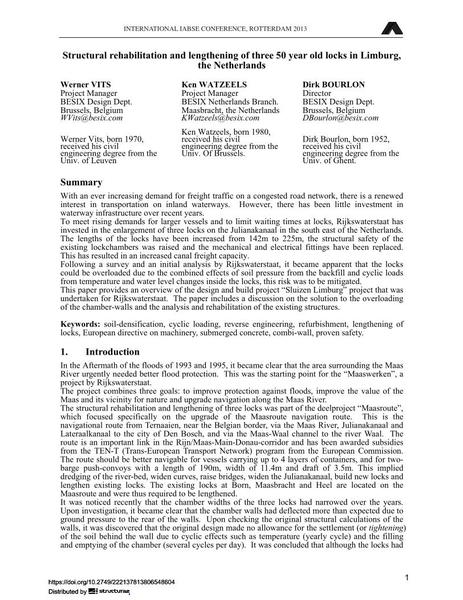Structural rehabilitation and lengthening of three 50 year old locks in Limburg, the Netherlands

|
|
|||||||||||
Bibliographic Details
| Author(s): |
Werner Vits
Ken Watzeels Dirk Bourlon |
||||
|---|---|---|---|---|---|
| Medium: | conference paper | ||||
| Language(s): | English | ||||
| Conference: | IABSE Conference: Assessment, Upgrading and Refurbishment of Infrastructures, Rotterdam, The Netherlands, 6-8 May 2013 | ||||
| Published in: | IABSE Conference, Rotterdam, May 2013 | ||||
|
|||||
| Page(s): | 620-621 | ||||
| Total no. of pages: | 8 | ||||
| Year: | 2013 | ||||
| DOI: | 10.2749/222137813806548604 | ||||
| Abstract: |
With an ever increasing demand for freight traffic on a congested road network, there is a renewed interest in transportation on inland waterways. However, there has been little investment in waterway infrastructure over recent years. To meet rising demands for larger vessels and to limit waiting times at locks, Rijkswaterstaat has invested in the enlargement of three locks on the Julianakanaal in the south east of the Netherlands. The lengths of the locks have been increased from 142m to 225m, the structural safety of the existing lockchambers was raised and the mechanical and electrical fittings have been replaced. This has resulted in an increased canal freight capacity. Following a survey and an initial analysis by Rijkswaterstaat, it became apparent that the locks could be overloaded due to the combined effects of soil pressure from the backfill and cyclic loads from temperature and water level changes inside the locks, this risk was to be mitigated. This paper provides an overview of the design and build project “Sluizen Limburg” project that was undertaken for Rijkswaterstaat. The paper includes a discussion on the solution to the overloading of the chamber-walls and the analysis and rehabilitation of the existing structures. |
||||
| Keywords: |
refurbishment cyclic loading submerged concrete reverse engineering soil-densification lengthening of locks European directive on machinery combi-wall proven safety
|
||||
